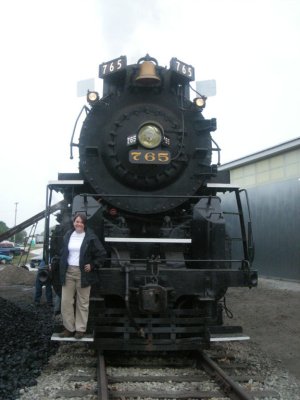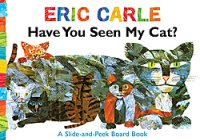Another
Column at MyShelf.Com
|
| Babe To Teens, Past |
INTERVIEW WITH FRAN CANNON SLAYTON, TIPS FOR WRITERS. NEW BOOK IDEASInterview with Fran Cannon Slayton Like Jimmy Cannon, I grew up in the 40s and 50s, and my father worked on the railroad. My dad wasn't the foreman though, he was a fireman. It was comforting to hear the old steam engines pull trains through our little Colorado town at night, and hear that whistle that sounds like nothing else. It's something that modern kids can only read about or see in the movies. Fran Cannon Slayton makes it all come to life in Jimmy's story. She makes a chapter out of the history books real and relevant in this compelling story. Fran was kind enough to answer some of my questions about When the Whistle Blows. Bev: I read the bio posted on your website. Wow, you have been a very busy lady. Tell us about yourself and your road to publishing a children's book.
When I was halfway finished with that second effort, I received a full scholarship to attend Highlights Magazine's week-long children's writers workshop at the Chautauqua Institute in July 2006. There I met my editor, Patricia Lee Gauch, who read the first 12 pages and loved them. She asked to see the rest, exclusively, and promised to read it while she was on vacation. She contacted me three weeks later and offered to work with me as I finished the novel, offering her opinions and insights. When I completed the book, she bought it!
Fran: Thank you. History truly can come alive when it is wrapped around stories that are exciting to begin with! I did a lot of research, but it was the fun kind of research. I interviewed people, took road trips, looked at pictures of trains online, and read about various details, including local history and colloquial expressions, to try to create the most believable and authentic setting possible. Much of the setting description came naturally to me, since I am intimately familiar with the town the book is set in: Rowlesburg West Virginia. Both of my parents are from there, and I have visited—and have loved—the place for my entire life. Bev: Tell us about developing the characters, Jimmy Cannon and his family and friends. Fran: Jimmy Cannon was inspired by my father, whose name is Jim Cannon. Dad grew up in Rowlesburg, West Virginia in the 1940's, and my love of the town comes directly from him. He had terrific adventures growing up there, and many of the stories in my book are based on true stories that my father actually experienced. The Cannon family had seven children, and I chose two of them—Bill and Mike—to be characters in my story. Of course in reality I don't really know exactly what my uncles were like as kids, but it was fun to use their names and create characters in their honor. I didn't intentionally leave my other relatives out; rather the story itself seemed to guide how big the fictional family had to be and I just tried to listen to what the story was calling for. Additionally, Jimmy's parents in my book are named W.P. and Mary Etta Cannon, as were my grandparents in real life. I did not know my grandfather at all because he died before I was born, so I made up his character completely, based upon some of my dad's old stories. It was wonderful to be able to use snippets of reality and blend them with fiction when creating my characters. I needed to let go of some real things in order to do it, which was an important lesson to learn. But hopefully the result is the best parts of both reality and imagination. Bev: And so, the setting in When the Whistle Blows —the town of Rowlesburg—is a real place? Fran: Yes, it is a real place that I encourage you to visit! It is not a rich town, but the people are wonderful and the scenery is stunningly beautiful. The Cheat River wraps itself around the town in a "U" shape, and there are mountains on three sides. When the railroad declined, however, so did the town. What was once a bustling little burg of 1800 people during my father's childhood is now a town of 600 or so that offers few places of employment within its limits. But the people who live there are rightfully proud of Rowlesburg, and are always working to make it a better place. The Rowlesburg Revitalization Committee is a group of old-timers and newcomers alike who work together for the good of the town. It's a great organization. Bev: What the heck is “dieselization,” anyway and why did it put so many men out of work? Wasn't there still a lot of maintenance and other relevant jobs with diesel engines? Fran: Dieselization refers to the era and events surrounding the replacement of the steam engine with the diesel engine. This happened to railroads worldwide at different rates of speed and at varying times, but in Rowlesburg it primarily occurred in the late 1940's and early 50's. Steam engine locomotives were complicated machines that took many, many people to run and maintain. At a minimum, each crew needed an engineer, a brakeman, a fireman and a conductor. Maintenance required extreme skill and the ability of many men to fashion new parts when the old ones needed replacing—which could happen at any place and at any time. The steam engines required a constant supply of coal and water to work, which also created jobs. And in the war days, trains were always hauling men and equipment for military purposes so they were constantly making trips east and west across the mountains. When the diesels came along, some positions—such as the fireman—were completely unnecessary and eventually eliminated. They used a different type of fuel and a simpler, more easily maintained engine, which eliminated many jobs. Many older people with steam experience were often replaced by younger—and fewer—folks who had knowledge and understanding of diesel engines. And eventually, as trucks became more prevalent for hauling cargo, railroads fell into harder and harder times. What had once been a revenue-generating, backbone of the community became a ghost of its former self. It was progress, on some levels. But loss of a way of life on other levels. Bev: Do you have relatives who actually worked on the Baltimore and Ohio (B&O) Railroad? Fran: Yes, my father's father was the foreman of the B&O Railroad in Rowlesburg in the l940s. My uncles Mike, Bill and Dick, as well as my cousins Roger and Kevin also worked for the railroad. Bev: Each chapter takes place in a different year on Halloween... tell us why you chose that date for each year. Fran: The lore in my family is that my grandfather was both born and buried on Halloween. There is something about this fact that really resonates with me—it is as if his life came full circle in a very concrete way. And to a certain extent, that is what my book is about—coming full circle. Bev: The secret society that Jimmy's father and uncles belonged to is intriguing... tell us about that. Fran: 'The Society' is a mysterious group of townsmen that Jimmy's father belongs to. It is unclear what they do, or what their ultimate purpose is for much of the book, and Jimmy chases around behind them, trying to figure them out during his yearly Halloween adventures. I have to confess that there was no real secret society back in 1940s Rowlesburg—that part of the book is truly fiction. But my father did—and does—belong to the Knights of Columbus, which is a fraternal organization of Catholic men, similar in some senses to the Masons. I think that my dad's participation in the K of C probably subconsciously influenced my creation of 'The Society." The K of C has some secretive elements, or at least it seemed so when I was a child. And they are very much about doing good and helping those in need, which plays into my book's plot as well. Bev: There are still a few spots in America that have steam engines and trains on a narrow gauge railroad and offer rides as a tourist attraction... Have you ever ridden on a train pulled by a steam engine?
Just this past Memorial Day I was invited to experience an old Nickel Plate steam engine in North Judson, Indiana that was running on eleven miles of track, sponsored by the Hoosier Valley Railroad and the Fort Wayne Historical Railroad Society. It was a fantastic event, drawing thousands of people. I was fortunate to be the guest of John Hankey, a Baltimore and Ohio Railroad historian who read an early version of my book and has since become a friend. Over the course of several magical days, John helped me to better understand the workings of a steam engine from the ground up. We talked brakes, air compressors, fireboxes, boilers... you name it! Best of all, I had the once-in-a-lifetime opportunity to be part of a steam locomotive in action—to feel the heat and humidity inside the cab, watch the fireman and engineer in action, and basically experience the ins and outs of the work my ancestors did every day of their lives. It was a weekend I will never forget! Bev: Jimmy Cannon is such a great character, it would be a shame to limit him to one book. Do you have any other plans for Jimmy? Fran: I would love to spend more time with Jimmy in the future, although I do not currently have plans for a sequel. Bev: Are you working on anything new? Fran: Right now I'm working on my next novel, which is a fantasy tentatively titled Ship's Boy, about a girl who wants to be a pirate. Bev: That sounds like fun! Do you have any other thoughts you would like to share with us? Fran: Thanks for having me!! Bev: It was entirely our pleasure, thank you so much and good luck with your new book. Click here to read Bev's review of When the Whistle Blows.
Writing for Children—Tips for
your Success Did you ever read a story where one of the characters had green eyes in chapter one, and then over in chapter three, they were brown? It isn't so easy to keep all the details straight when you are writing a story... but that isn't going to happen to you, is it? Of course not, because you are going to keep a detailed profile on each character. Here is a handy profile chart that you can download to help you learn absolutely everything about your character. Complete one for each character in your story. This highly detailed chart is a writer's guide to creating fictional characters who are believable, captivating, and unique You won't need every detail in your story, but don't take any shortcuts here... fill in the blanks anyway. You need to know everything about your character to be able to portray his personality and make your complex character come alive for your reader. Now practice writing profiles, and see just what kind of characters you can imagine! Brand new books for summer reading:
A Round the World search for a little boy's beloved cat. Lots of excitement for the board-book set.
Soon Cammie is joining Bex and Liz as Macey's private security team on the campaign trail. The girls must use their spy training at every turn as the stakes are raised, and Cammie gets closer and closer to the shocking truth. Ages 9-12 will enjoy this fast moving summer read.
|
|
2009 Past Columns |
||||||||||
 Fran:
I double majored in Psychology and Religious
Studies at the University of Virginia, and then
went to work on Capitol Hill for two years.
A few months before going back to law school
(again at UVA), an idea for a story took hold
of my brain; I couldn't shake it so I just gave
in and started writing. Thirteen years and 100
pages later, and after careers as both a child
sex abuse prosecutor and legal publisher, my
daughter was born and I decided to get serious
about my writing. I looked at my 100 pages and
decided I just couldn't risk showing it to the
world. So put it away and began my next novel.
That was around the beginning of 2005.
Fran:
I double majored in Psychology and Religious
Studies at the University of Virginia, and then
went to work on Capitol Hill for two years.
A few months before going back to law school
(again at UVA), an idea for a story took hold
of my brain; I couldn't shake it so I just gave
in and started writing. Thirteen years and 100
pages later, and after careers as both a child
sex abuse prosecutor and legal publisher, my
daughter was born and I decided to get serious
about my writing. I looked at my 100 pages and
decided I just couldn't risk showing it to the
world. So put it away and began my next novel.
That was around the beginning of 2005.
 Fran:
Yes, and I wasn't just a passenger on the train—I
recently had the opportunity to actually ride
in the cab of an old, refurbished, working steam
engine!
Fran:
Yes, and I wasn't just a passenger on the train—I
recently had the opportunity to actually ride
in the cab of an old, refurbished, working steam
engine!

